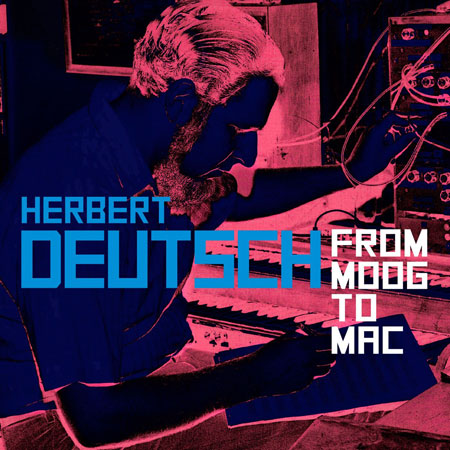Herbert Deutsch – From Moog to Mac

Composer Herbert Deutsch (born 1932) was Professor Emeritus of Music at Hofstra University, where he taught for a mere 55 years and inaugurated their electronic music studio, and many other music programs. In the early 1960s, he collaborated with Robert Moog on the first Moog synthesizer, providing a musician’s insight to counterbalance and aid the technical breakthroughs of the “mad scientist.” As you may have guessed from its title, the From Moog to Mac CD is a collection of rarely heard yet historic works caught on tape during the early years of the development of the synth, appended with some later pieces on the personal computer. “A Christmas Carol” (1963) presents via tape manipulation an array of cut-up musique concrete sounds—including snippets from a radio play containing news reports of church bombings in Birmingham, Alabama—along with piano, drums, cymbals, ratchet, radio test oscillators, choral singing and scads of low-end synth damage. Some nice drones, echoes and knocks also get thrown into the mix. “The Abominatron” (1964) was the nickname Robert gave the first Moog synth. In this track, he gives a demonstration of the newly emerging instrument, verbally introducing each sound sample. Dissonant and consonant organ-like stabs, and plenty of bleeping sawtooth and squarewave mayhem dot this crude soundscape.
“Jazz Images, a Worksong and Blues” (1964) was the first-ever piece of music played using the sounds of a Moog. It ranges from homely keyboard melodies with deep piano rumbles to strange, repeating squeaks with jazz trumpet and piano to electronic explosions and humorous squiggly freakouts–only to segue into a straight blues ditty. “A Little Night Music: The Ithaca Journal” (1965) was composed for the Summer 1965 Workshop and Seminar in Electronic Music Composition. It’s another multi-track adventure into the realm of musique concrete, dominated by Tibetan trumpet, random samples of classical music, spoken word, and news tidbits recited from the Ithaca Journal on August 6, 1965. The Moog contributes plenty of bloop-bleeps, squiggles, rising and falling drones and some swell, dissonant keyboard fuzz. “Prologue to King Richard II” (1971) was composed for the 60th year of an annual Shakespeare festival at Hofstra and played throughout the theater on rotating speaker system. It proffers a pleasant enough melody, capturing the modal quality of late Rennaisance music from the 1600s, along with some random spoken narration.
Unfortunately, the CD veers toward schmaltz during “Sleight of Hand (Mr. Magic Man)” (1989) a ditty about a magician whose act hypnotizes a woman in the audience. Backed up with a big beat and a jazzy acoustic guitar, a woman’s clear, melodic singing combines with some subtle, swooshing Moog in this cheesy cabaret show tune. “Abyss” (1994) presents a desperate conflict between a mother and her schizophrenic son, as layers of dreamy, droning keyboard create a relaxing ambience that gets punctured with piccolo and a melancholy mezzo-soprano. “Fantasy on Sometimes I Feel Like a Motherless Child” (1995) takes on a negro spiritual from the early 20th century with some smooth jazz sax contemplation, which is fortunately saved by severe, dissonant keyboard stabs later the piece, right before it gets all pleasantly rhythmic on your ass. Appropriately closing out the set, the strange and sad “Two Songs Without Words for Theremin and Piano” (2007) combines some melancholy piano and theremin melodies inspired by Robert Moog’s battle with cancer. All told, From Moog to Mac is a very decent disc for anyone interested in the development of the Moog, and/or the second decade of musique concrete.
Label: Ravello Catalog Number: RR 7846 Format: CD Packaging: Digi-Pak Tracks: 10 Country: United States Released: 2012 More: Amazon, Moog Archives, NAMM, Snapshots, Vimeo
Text ©2013 Arcane Candy
Leave a Reply